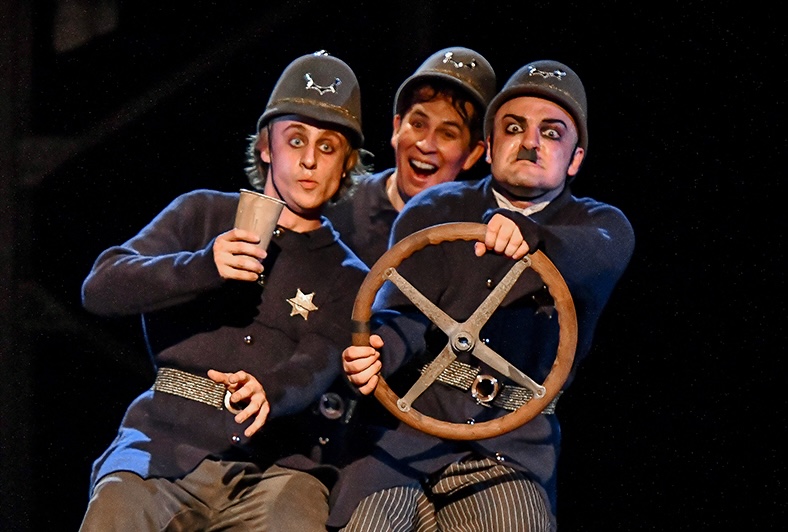Troubled Pathway
Defaulting to sound bites and talking points, Theater J's 'Benedictus' feels more workshop than finished work
One of the toughest lessons to teach a beginning visual artist is the understanding that every piece they create will not be a finished work of art. Sometimes the scattering of marks made on the page are nothing more than exercises, graphite clouds as they try to figure out how to coax line and form and objects from the blank page.
But the impulse is to ignore this most difficult stage of learning, the part where one must release control. Make the occasional gross or awkward mark. Erase with disregard and enthusiasm.

‘Benedictus’
(Photo by Stan Barouh)
It’s about starting out on a path of seeing what might become, instead of forcing the something to be — a lesson to be considered by the artists behind the play Benedictus, now on stage at Theater J. An intriguing concept and creation story is lost to a frenzy of cross talk and tangled lines. The audience is given no one to trust, no guide who can be reliable even in his unreliability. Story has been replaced by a teetering and constantly growing pile of agendas that are too politically-positioned to inspire discussion and too confusing to engage attention.
In short, what is presented feels more workshop than finished work.
This would be less disappointing if the ideas behind the show were not so intriguing. Benedictus began life as a collaboration between three Americans, two Iranians and the Israeli playwright Motti Lerner. The drama is set in the city of Rome as two childhood friends — one Jewish (a former Iranian now living out-of-country), the other Muslim (an Iranian politician) — meet secretly in a monastery. Asher Motahedeh (Michael Tolaydo) accepts Ali Kermani’s (Michael Kramer) invitation expecting the opportunity to sell him arms to use against an American invasion planned to begin in just 48 hours. Since leaving Iran, Motahedeh has built a successful life for himself arming others to go to war.
Kermani, however, wants to find a way to put off war with the United States through negotiation. He’s come not for weapons, but for his old friend’s connections.
So the bones are there. The backstory of the play’s creation and the premise of the show itself have promise and should make for something exciting and provocative.
Where Benedictus fails is its refusal to take a side. This is not to suggest that the play should be pro-American or pro-Iranian (though there are hints that Kermani is meant to be our battling hero), but it should have some point of view, some definitive place for the audience to begin its relationship with both the story and its characters.
Instead Benedictus becomes quickly bogged down in what wants to be layers of tension and growing confusion but is instead muddy, uncertain ground. Characters dissolve to the point where we lose faith in anything that we are told. There is nothing to discuss or debate because everything is possibly false. Which means that not only are the characters deceiving one another, the play is deceiving its audience.
The actors involved with this production, which also includes Conrad Feininger as a disillusioned and misguided member of the U.S. State Department and Richard Mancini, soldier on admirably. Tolaydo and Kramer do their best to bring some amount of life to their characters though there is very little foundation given to them. Feininger seems disconnected in his role, as though he’s still feeling his way along in the play. Mancini is largely played for laughs as the monk in charge of the monastery meeting room, though it’s unclear if that was the intention of either actor or the playwright.
And this is the recurring issue with Benedictus. Its intention and reason is unclear and indiscernible. The motivation for an audience to care and invest is taken for granted. If Benedictus is an exercise meant to demonstrate the vast complexity of the politics shaping the tensions between the U.S. and the Middle East, it defaults to sound bites and talking points that are well-documented. If it is meant to be a more human drama, bringing the scale of global conflict down to the size of a table between two friends, it fails to offer us true humanity or personal emotion.
The ideas are there. The hope is there. But what Benedictus wants to be still feels buried under work that remains to be done.
Support Metro Weekly’s Journalism
These are challenging times for news organizations. And yet it’s crucial we stay active and provide vital resources and information to both our local readers and the world. So won’t you please take a moment and consider supporting Metro Weekly with a membership? For as little as $5 a month, you can help ensure Metro Weekly magazine and MetroWeekly.com remain free, viable resources as we provide the best, most diverse, culturally-resonant LGBTQ coverage in both the D.C. region and around the world. Memberships come with exclusive perks and discounts, your own personal digital delivery of each week’s magazine (and an archive), access to our Member's Lounge when it launches this fall, and exclusive members-only items like Metro Weekly Membership Mugs and Tote Bags! Check out all our membership levels here and please join us today!























